Disclaimer: Abergavenny Food Festival provided Quench with press accreditation and passes.
Sometimes it’s very easy for Wales to be left off the map, especially in terms of anything food related. After all, if you try to mention any Welsh delicacies, whether in the form of laverbread and cockles or cawl, to any outsider, you’re often going to be met with a bewildered and confused glare, except for when they chime in about how much they love rarebit. Granted, the U.K’s generally anglocentric approach to all things culinary isn’t perhaps their own fault, especially when revered critics such as Jay Rayner suggest that the best lunch in Cardiff was actually in Central Station, on the train to Bristol. These tired and sorry stereotypes, despite their incredibly dated message, have been widely believed by anyone who hasn’t had the fortune of actually travelling and/or spending any time in Wales. However, in more recent times, the nation’s culinary notoriety has been slowly pieced together, like some thousand piece jigsaw in which the English is deliberately hiding the pieces from you.
For me, there are a few consistent food events in the year that always remain at the forefront of my mind; the announcement of the annual line-up of Street Food Circus at Roath Yard, the inevitably insane ideas that Sam & Shauna are waiting to unleash on the world, and just about anything that Gareth Ward says or does. Much to my pleasure, and by no sheer coincidence, Abergavenny Food Festival almost always seems to collate all of my wildest culinary dreams into one weekend-sized extravaganza, much to my wallets dismay.
Like any good food festival, AFF brought the hidden gems and unsung food producing heroes of the region for public display. From local honey producers to small-batch gin distilleries made in the heart of Monmouthshire, it ensured it covered the board in terms of variety of produce available to purchase and try. Alongside the various producers stalls came one of the strongest lineups of street food traders from across the South West and Wales, my favourites of which included Brother Thai, Murray Mays, Beefy Boys and Pink Peppercorn Food Co. If you dreamt up a list of every fantastic trader from the region, you’d be surprised that you were actually able to find just about all of them crammed across the various markets of the small mountainous town. Similarly, alongside the obscene volume of simply fantastic food came a smorgasbord of varying talks, demos and masterclasses; some free, some paid. From cooking over fire to delicate cocktail making a foraging, there was a surplus of activities to keep yourself entertained over both days.

But all of this just sounds routine, right? – a small-ish town with a strong food culture holding an annual event to showcase all the good things it creates alongside a healthy bit of foot traffic. But is that really enough anymore? In the age of increasingly apparent and readily visible times of ecological and political uncertainty, food festivals have evolved into something much greater than a simple glamour parade for good food.
Fortunately, especially within the last three years since the appointment of Aine Morris as CEO, Abergavenny has succeeded in providing a key role in leading by example; the festivals experience allowed for a sense of security in historical achievement on which the foundations for a new evolved state of food festival could emerge.
It’s no secret that we live in particularly uncertain and volatile times. Both politically and subsequently financially, it’s a little difficult to put on a huge show celebrating everything without addressing the multiple elephants in the room. Where October 31st could see the whole of the U.K fall into total economic isolation, our society is simultaneously committing an accelerated ecological suicide through unsustainable fast trend-swapping and gross consumerism. From talking to Aine across the preview events alongside the press launch on the Saturday morning, it’s clear that there wasn’t any sense of oblivity or naivety across the whole of the management.
In terms of the ongoing climate emergency, by demanding traders proof of sustainable thinking through to the workshops of utilising how to use a pig from nose to tail, this top-down enforced ethically driven policy ensured that AFF was leading the charge from the front. Similarly, it’d be impossible to talk about the meteoric rise in veganism across the last few years and its effect on popular culture. With appearances from the likes of Sam and Shauna alongside Gareth Ward and others, it’d be easy to fall into the trap of believing that they have simply ignored the sustained plea of vegans in the pursuit of good food. From speaking to the majority of chefs across the event, there seemed to be a general consensus; eat less meat, but know where it comes from. Where Hang Fire remains a destination for meateaters from across the country, their cooking demo at the stage was done alongside farmer Martha Roberts, demonstrating the need to have greater understanding of the origin of food. With talks on sustainable farming and various roles from across the culinary sector, AFF continued to inspire the desire to have a direct, traceable line from farm to plate, something we should all be willing to uphold.
Politically, it was clear that everything wasn’t going over their heads. From the stalls to the talks on offer, the reality of ÔÇÿscaremongering’ that has surrounded a No Deal Brexit had materialised into an amalgamation of talks and workshops. Where Operation Yellowhammers official release, in which it details the potentiality of food shortages across the nation, was only available for public viewing this August, the programme for AFF had well established. Not only does this confirm the suspicion that the whole food sector has long feared and understood the crippling effects of a No Deal Brexit, but also that they’ve been doing their best to ensure that they, and the public, are best prepared for the scenario.

In addition to unavoidable political topics, AFF equally sought to educate on the less covered more nuanced topics. Specifically, where the #MeToo movement made strides its debut a few years ago, the festival held discussions to unveil the often unconsidered branching effects of wider movements. At the press launch event, we were gifted to a snippet of the long and fascinating story of Asma Khan, who Shauna Guinn of Hang Fire was quick to tell me of how much of a “f****** legend” she was. Her story from hosting small supper clubs from the comfort of her family home, through to her own episode of Netflix’s Chef’s Table with her restaurant boasting a wholly female kitchen staff was particularly apt and aligned perfectly with the message being depicted. Alongside these discussionary talks came a wide gamut of other issues being tackled by those both inside and outside of the industry.
“Like holding a concert on the Titanic (if the whole boat knew about the iceberg all along, and yet still refused to divert course)”
There’s no denying that we live in particularly unsettling times, with doubt and uncertainty across the board, it’d be easy to think that hosting a food festival would be at the bottom of anyone’s priority list. I’ve had the fortune of attending a wide range of food festivals over the years; some good, some great, some shallow. Equally, I would agree with the previous statement, if AFF was solely about putting on a show; like holding a concert on the Titanic (if the whole boat knew about the iceberg all along, and yet still refused to divert course). Nevertheless, it’s difficult to host any public event in any profession or sector without ignoring ongoing political situation; the ability of the management of Abergavenny Food Festival to understand this and take it into account was both necessary and forward-thinking. Where it succeeded in its objectives of providing the basic food festival criteria alongside pushing for deeper thought in understanding both what and where your food comes from, the festival is a pleasant reminder that these events can be more than just a glorified show and tell. By retaining both its desirability as a destination for foodies and families alike, alongside the aspiration for everyday people to give greater thought to anything and everything about their food, AFF finds itself truly successful. If all festivals were to take a page out of Abergavenny’s book, we may just end up in a safer, more sustainable place.
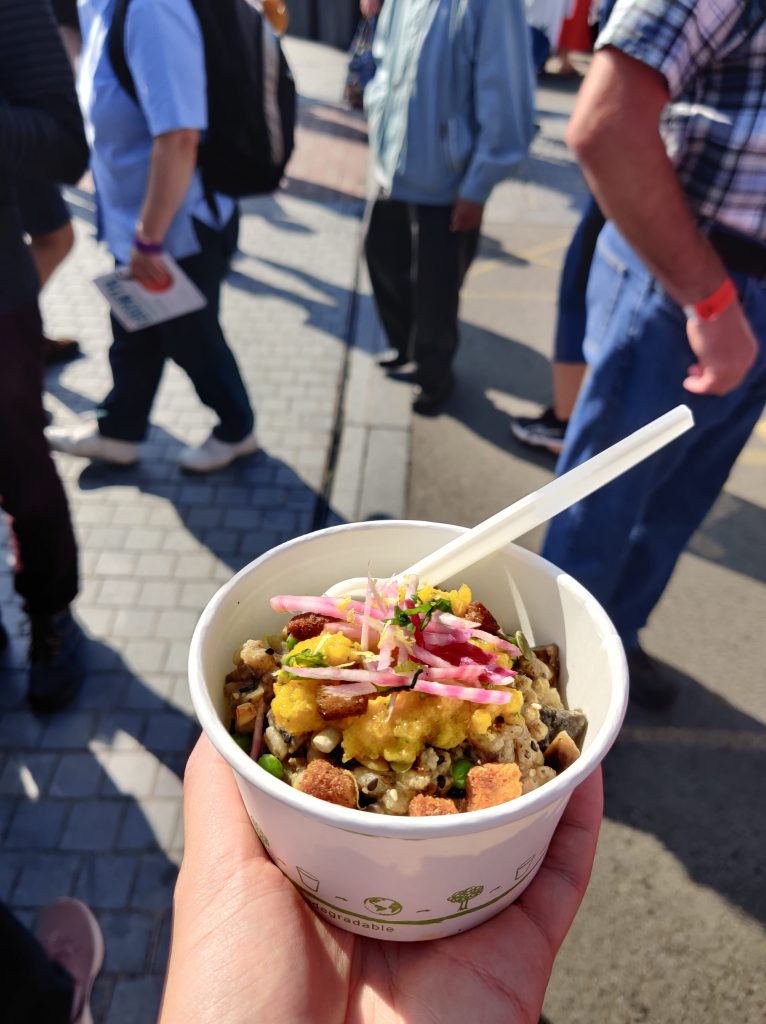
Mushroom Miso Risotto from @pink_peppercorn_food_fo. 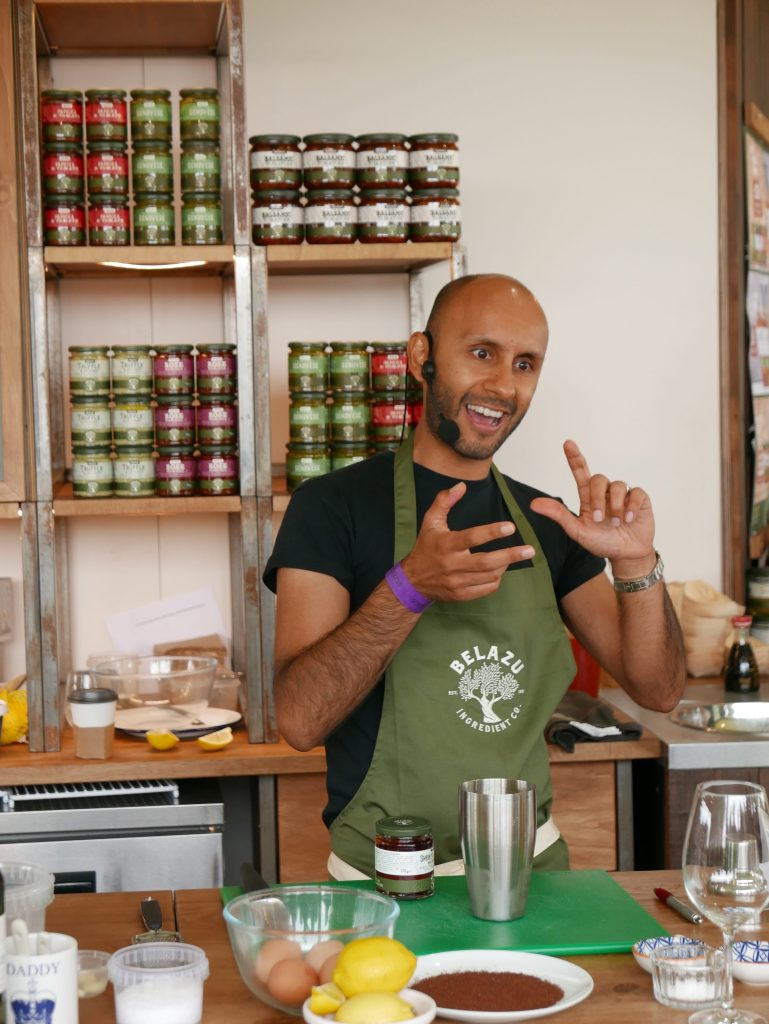
Imran Nathoo (@kitchenclonc) at the Belazu tent. 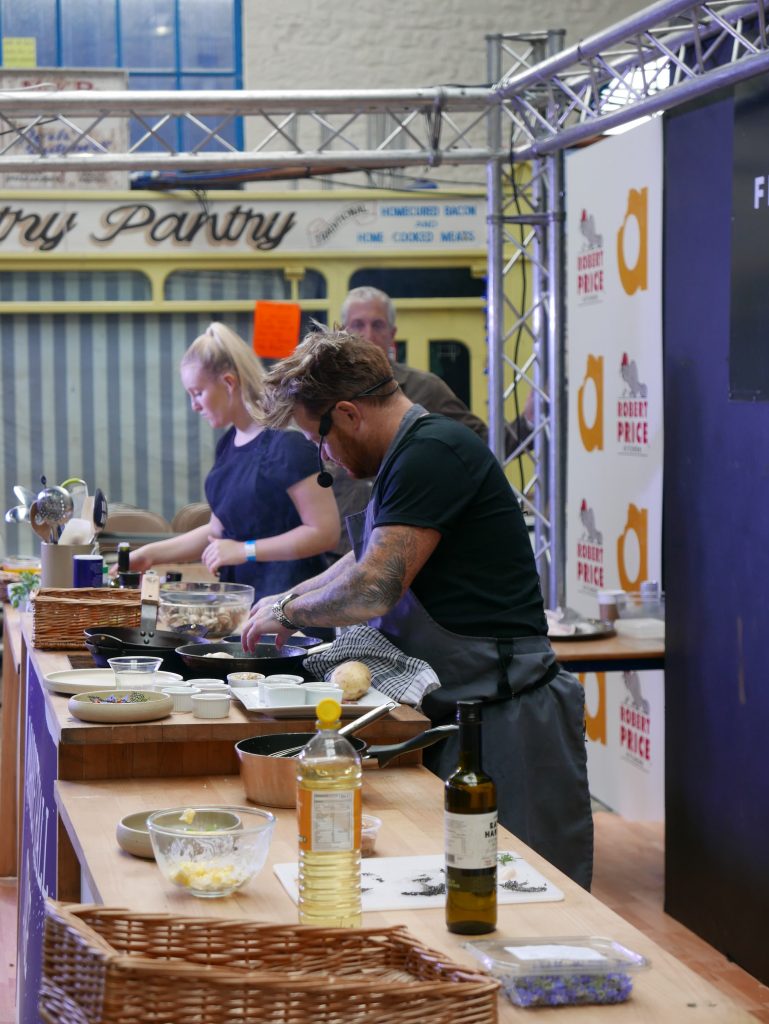
Chef Tommy Heaney at the Market Hall Stage. 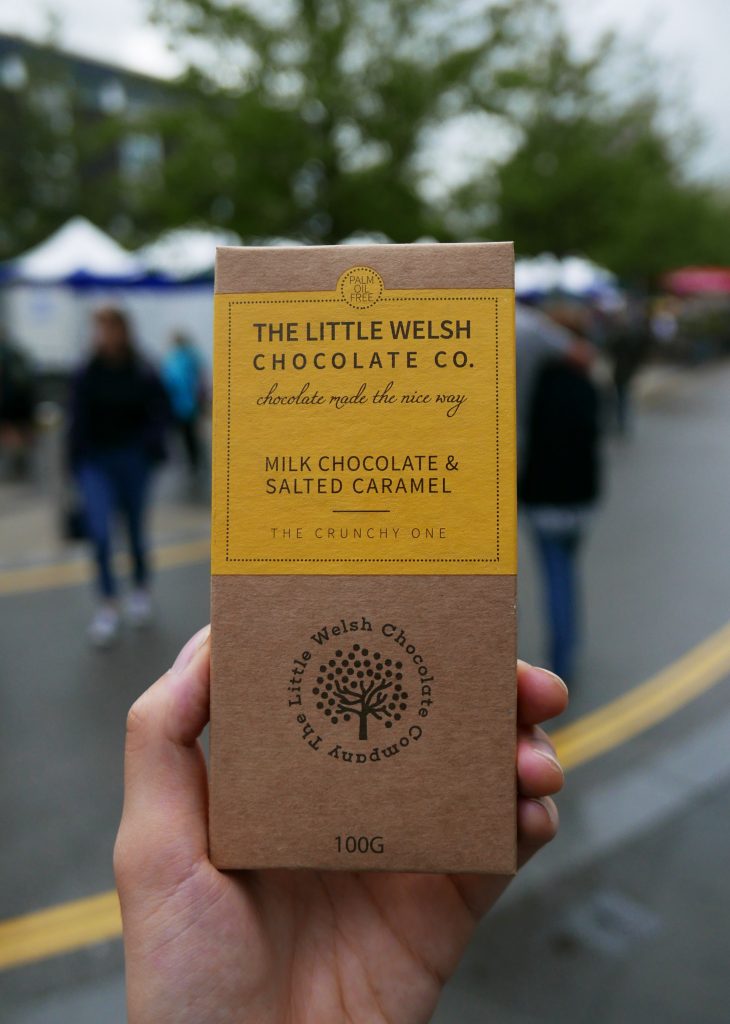
Salted Caramel Chocolate from @littlewelshchoc. 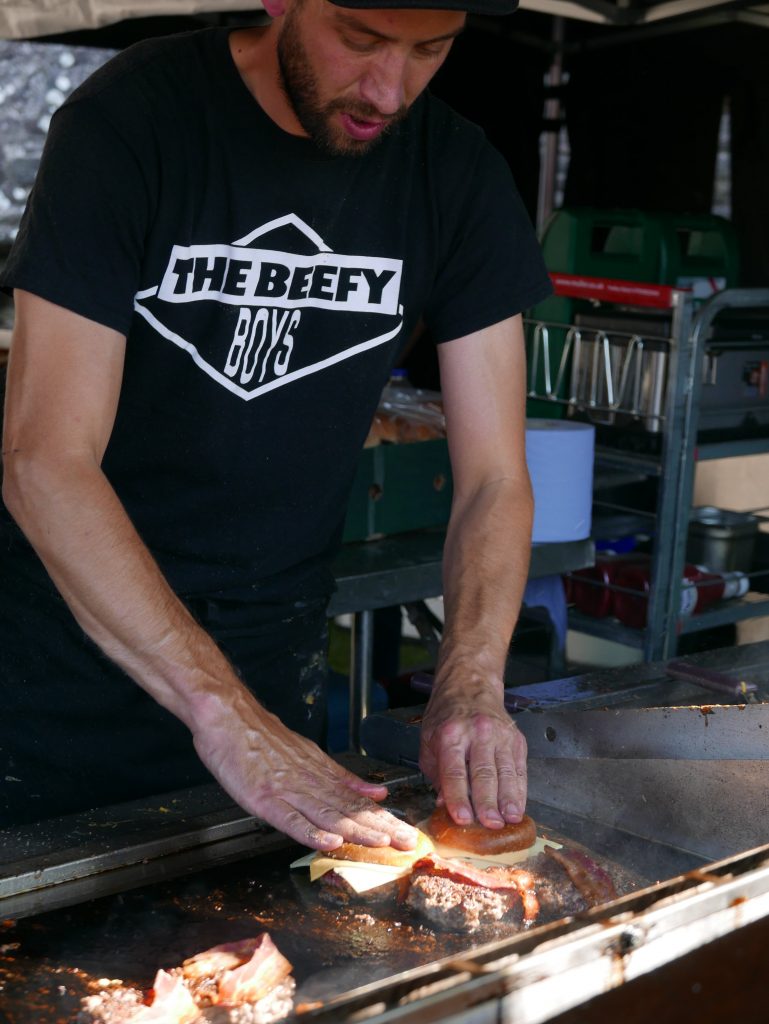
@thebeefyboys making the magic happen. 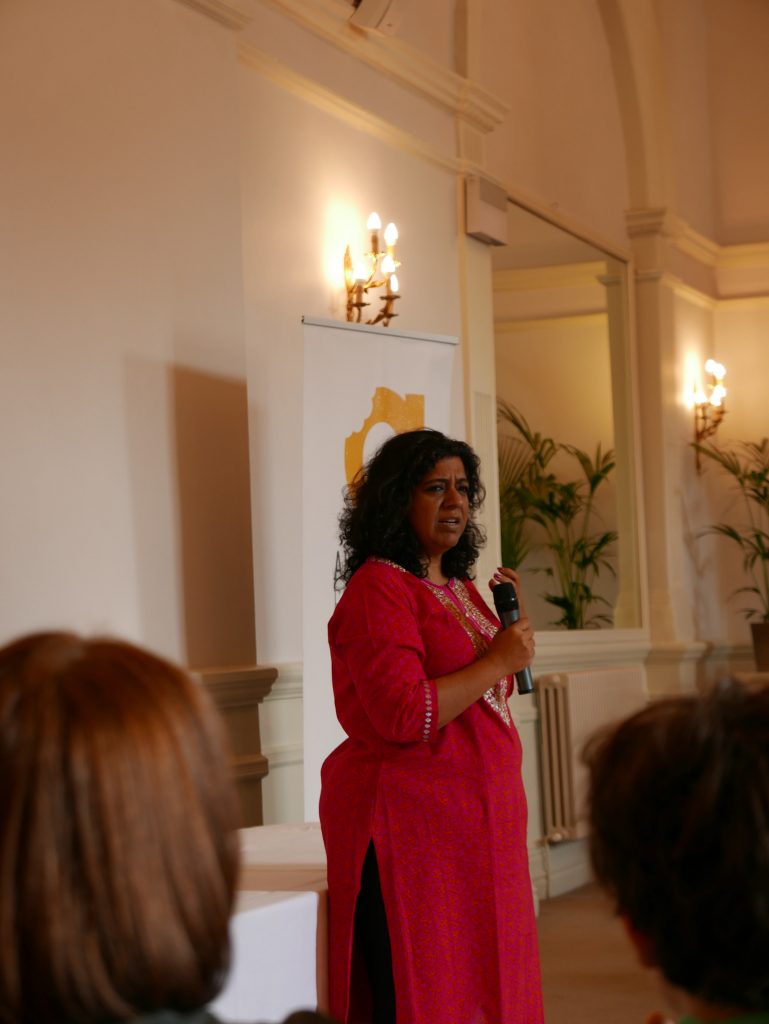
Asma Khan telling her story at the Press Launch event.


